Collective Communication
Overview
In the MPI sum program we looked at, all processes send their partial sum to process 0, who computes the final sum.
This means that process 0 must do $N - 1$ receive and addition operations:
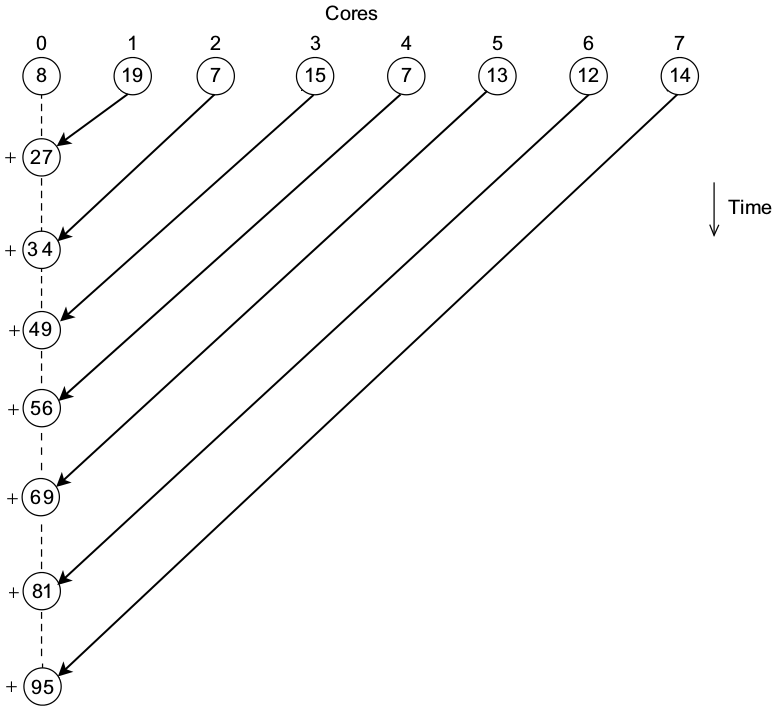
This can be done more intelligently by having the processes compute the global sum in a tree fashion:
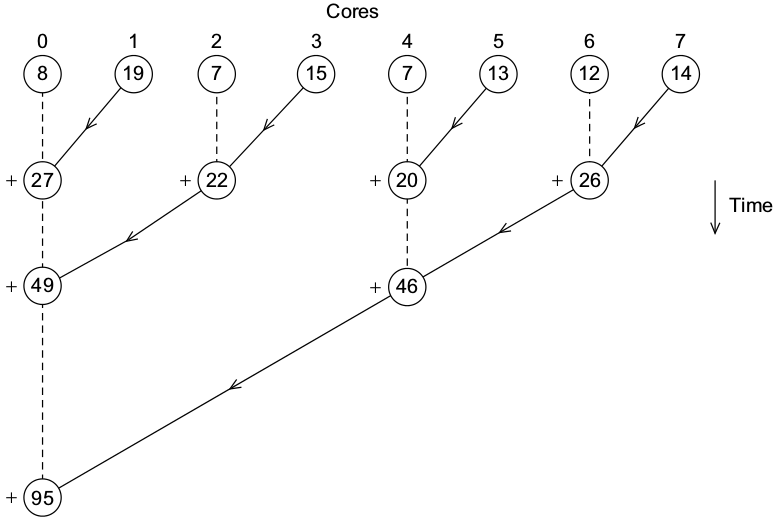
We could implement this with the point-to-point message passing we have seen, but this pattern is so common that MPI has support for this directly.
MPI_Reduce
The global sum problem is an example of a reduction problem. We want to apply some operation across a set of data, and collect the result as one value.
MPI_Reduce is a collective communication function. It is used to specify that some communication should happen amongst all processes. The function looks like this:
The parameters are described below:
sendbuf
A pointer to the piece of data this process is supplying. This is the partial sum in our example.
recvbuf
A pointer to the memory location where the final answer should be stored.
count
The number of elements in the send buffer.
datatype
The type of element in the send buffer.
op
The reduction operator to apply. This can be one of:
- MPI_MAX
- MPI_MIN
- MPI_SUM
- MPI_PROD
- MPI_LAND
- MPI_BAND
- MPI_LOR
- MPI_BOR
- MPI_LXOR
- MPI_BXOR
- MPI_MAXLOC
- MPI_MINLOC
root
The rank of the process which receives the final answer.
comm
The communicator group.
Sum Example
The program below uses MPI_Reduce to implement the parallel sum:
#include <stdlib.h>
#include <mpi.h>
#include <stdio.h>
#define START 0
#define END 100
int main(int argc, char** argv) {
int rank, size;
/* initialize MPI */
MPI_Init(&argc, &argv);
/* get the rank (process id) and size (number of processes) */
MPI_Comm_rank(MPI_COMM_WORLD, &rank);
MPI_Comm_size(MPI_COMM_WORLD, &size);
/* calculate the start and end points by evenly dividing the range */
int start = ((END - START) / size) * rank;
int end = start + ((END - START) / size) - 1;
/* the last process needs to do all remaining ones */
if (rank == (size - 1)) {
end = END;
}
/* do the calculation */
int sum = 0, i;
for (i = start; i <= end; i++) {
sum += i;
}
/* debugging output */
printf("Process %d: sum(%d, %d) = %d\n", rank, start, end, sum);
/* do the reduction */
int final;
MPI_Reduce(&sum, &final, 1, MPI_INT, MPI_SUM, 0, MPI_COMM_WORLD);
/* now have process 0 display the results */
if (rank == 0) {
printf("The final sum = %d.\n", final);
}
/* quit MPI */
MPI_Finalize();
return 0;
}
Note that this program is shorter, and should be more efficient as well.
MPI_Reduce Caveats
Note the following about MPI_Reduce:
- All the processes in the communicator group must call MPI_Reduce.
- The parameters must be compatible, i.e. the datatype, operator and root must match.
- The recvbuf is only used by the root process, but we still must pass an argument for each process.
- We can not use the same memory location for both the sendbuf and recvbuf.
MPI_Allreduce
The MPI_Reduce function only gives one process the final result. This can be seen if we have each process print the sum:
/* do the reduction */
int final;
MPI_Reduce(&sum, &final, 1, MPI_INT, MPI_SUM, 0, MPI_COMM_WORLD);
/* print the answer */
printf("The final sum = %d.\n", final);
Sometimes, however, we may want all processes to have access to the final result. We could send the result to all processes using point to point communication, or we could use MPI_Allreduce instead:
int MPI_Allreduce(const void *sendbuf, void *recvbuf, int count,
MPI_Datatype datatype, MPI_Op op, MPI_Comm comm)
The function is identical to MPI_Reduce except that there is no root process - all processes receive the result.
MPI_Allreduce can be implemented with two tree structures:
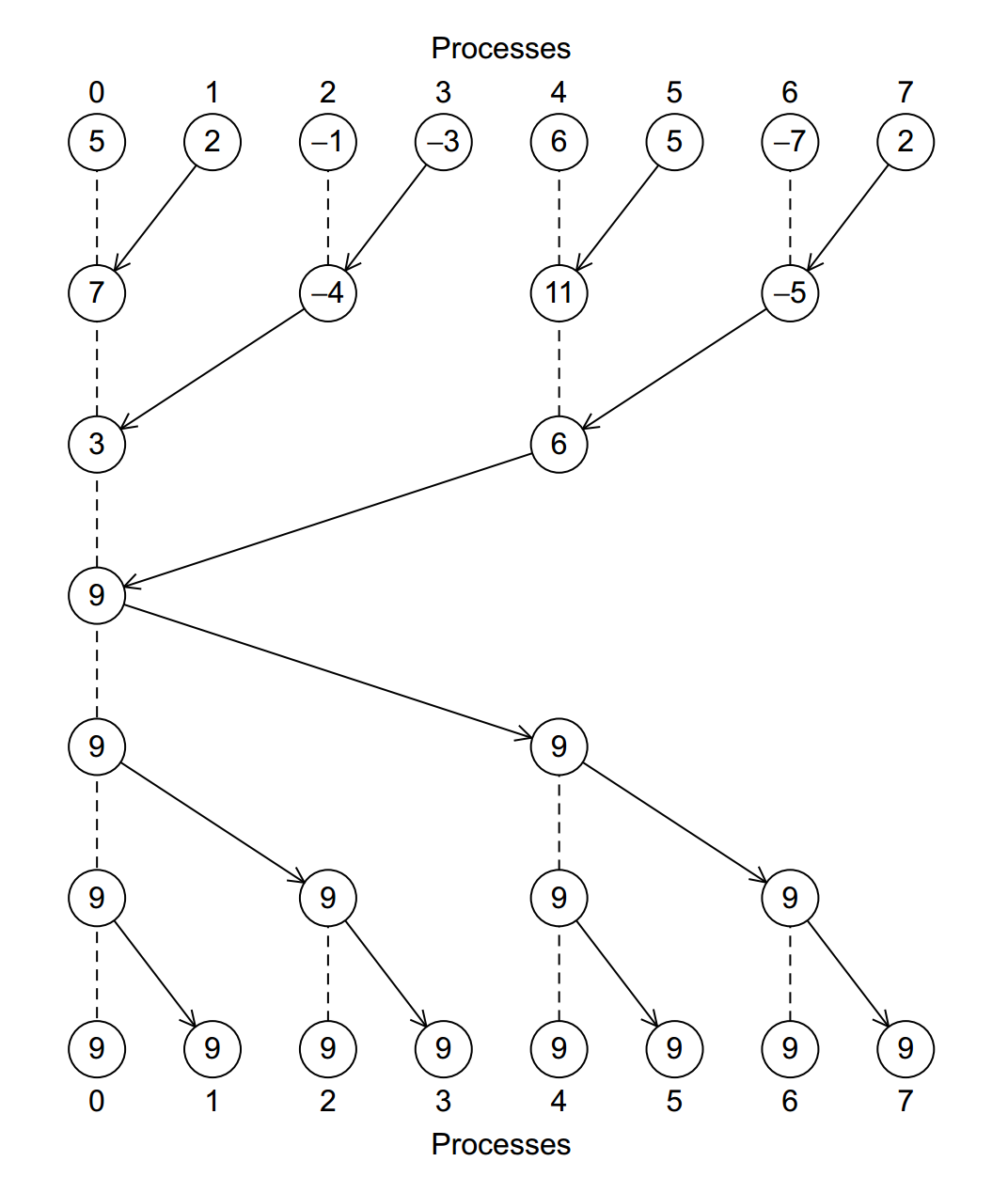
It can also have the processes exchange partial sums, which is sometimes called a butterfly:
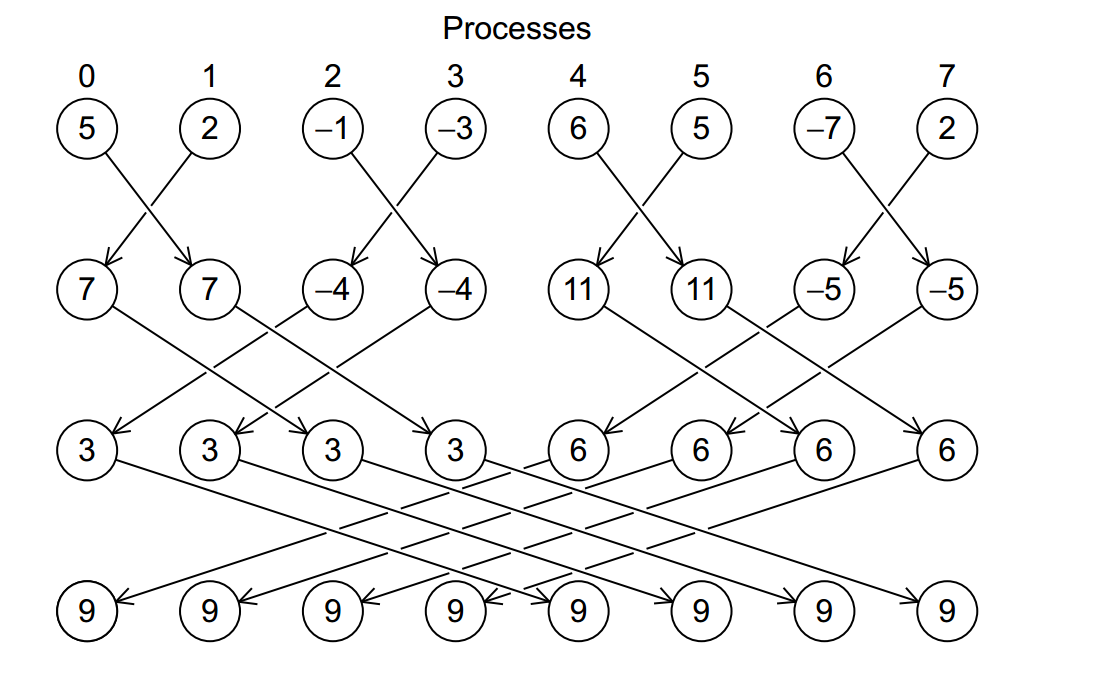
MPI_Bcast
If we want to simply send a value from one process to all other processes, we can do that efficiently with a broadcast operation.
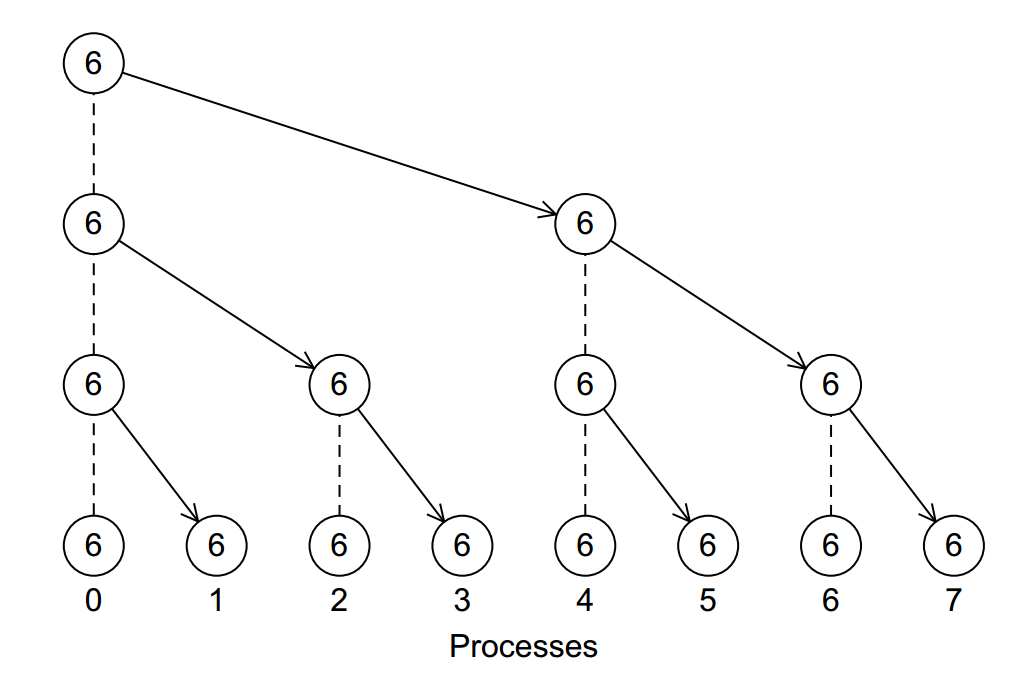
This is done with the MPI_Bcast function:
int MPI_Bcast(void *data, int count, MPI_Datatype datatype, int root,
MPI_Comm comm)
The parameters are as follows:
data
A pointer to a data buffer. For the process which is sending the data, this buffer is read from. For all other processes, it is written to.
count
The number of items being broadcast.
datatype
The type of data being broadcast.
source
The rank of the process sending the data, all other processes receive.
comm
The communicator group, which is often MPI_COMM_WORLD.
A common usage of MPI_Bcast is sending input values to all processes - since only process 0 can read from stdin. The following program demonstrates this.
#include <stdio.h>
#include <mpi.h>
int main(int argc, char** argv) {
int rank, size;
/* initialize MPI */
MPI_Init(&argc, &argv);
/* get the rank (process id) and size (number of processes) */
MPI_Comm_rank(MPI_COMM_WORLD, &rank);
MPI_Comm_size(MPI_COMM_WORLD, &size);
/* the data our program operatres on */
char string[100];
/* have process 0 read in a string */
if (rank == 0) {
printf("Enter a string: ");
fflush(stdout);
scanf("%s", string);
}
/* now broadcast this out to all processes */
MPI_Bcast(string, 100, MPI_CHAR, 0, MPI_COMM_WORLD);
/* print the string */
printf("Process %d has %s!\n", rank, string);
/* quit MPI */
MPI_Finalize();
return 0;
}
Scatter & Gather
In many parallel programs, we want each process to work on a subset of an array. We could accomplish this by dividing the array into chunks, and sending each chunk to one of the processes. MPI provides a function just for this, however, MPI_Scatter:
MPI_Scatter(void* sendbuf, int sendcount, MPI_Datatype sendtype,
void* recvbuf, int recvcount, MPI_Datatype recvtype, int root, MPI_Comm comm);
The root process sends data while the others receive data.
The following program uses MPI_Scatter to split the input array amongst all processes:
#include <string.h>
#include <stdio.h>
#include <stdlib.h>
#include <mpi.h>
#define N 16
int main(int argc, char** argv) {
int rank, size;
int* data;
/* initialize MPI */
MPI_Init(&argc, &argv);
/* get the rank (process id) and size (number of processes) */
MPI_Comm_rank(MPI_COMM_WORLD, &rank);
MPI_Comm_size(MPI_COMM_WORLD, &size);
/* have process 0 read in the data */
if (rank == 0) {
printf("Enter %d values: ", N);
fflush(stdout);
data = malloc(N * sizeof(int));
for (int i = 0 ; i < N; i++) {
scanf("%d", data + i);
}
}
/* our portion of the data */
int portion[N / size];
/* now scatter the array to all processes */
MPI_Scatter(data, N / size, MPI_INT,
portion, N / size, MPI_INT, 0, MPI_COMM_WORLD);
/* print the data */
for (i = 0; i < (N / size); i++) {
printf("Process %d has %d!\n", rank, portion[i]);
}
/* quit MPI */
MPI_Finalize();
return 0;
}
Oftentimes, we will want to do the opposite: gather a portion of data from each process into one array in one process. This can be done with MPI_Gather:
int MPI_Gather(void *sendbuf, int sendcount, MPI_Datatype sendtype,
void *recvbuf, int recvcount, MPI_Datatype recvtype, int root, MPI_Comm comm)
This function takes exactly the same parameters as MPI_Scatter, but goes in the opposite direction. The following program extends the previous one to scatter data to all processes, have them square their data, then gather the results:
#include <string.h>
#include <stdio.h>
#include <stdlib.h>
#include <mpi.h>
#define N 16
int main(int argc, char** argv) {
int rank, size, i;
int* data;
/* initialize MPI */
MPI_Init(&argc, &argv);
/* get the rank (process id) and size (number of processes) */
MPI_Comm_rank(MPI_COMM_WORLD, &rank);
MPI_Comm_size(MPI_COMM_WORLD, &size);
/* have process 0 read in the data */
if (rank == 0) {
printf("Enter %d values: ", N);
fflush(stdout);
data = malloc(N * sizeof(int));
for (i = 0 ; i < N; i++) {
scanf("%d", data + i);
}
}
/* our portion of the data */
int portion[N / size];
/* now scatter the array to all processes*/
MPI_Scatter(data, N / size, MPI_INT,
portion, N / size, MPI_INT, 0, MPI_COMM_WORLD);
/* have each process square its data */
for (i = 0; i < (N / size); i++) {
portion[i] *= portion[i];
}
/* gather the data back up in process 0 */
MPI_Gather(portion, N / size, MPI_INT,
data, N / size, MPI_INT, 0, MPI_COMM_WORLD);
/* have process 0 print the results */
if (rank == 0) {
printf("Results: ");
for (i = 0; i < N; i++) {
printf("%d ", data[i]);
}
printf("\n");
}
/* quit MPI */
MPI_Finalize();
return 0;
}
There is also MPI_Allgather for situations where we want all processes to have the updated data array.